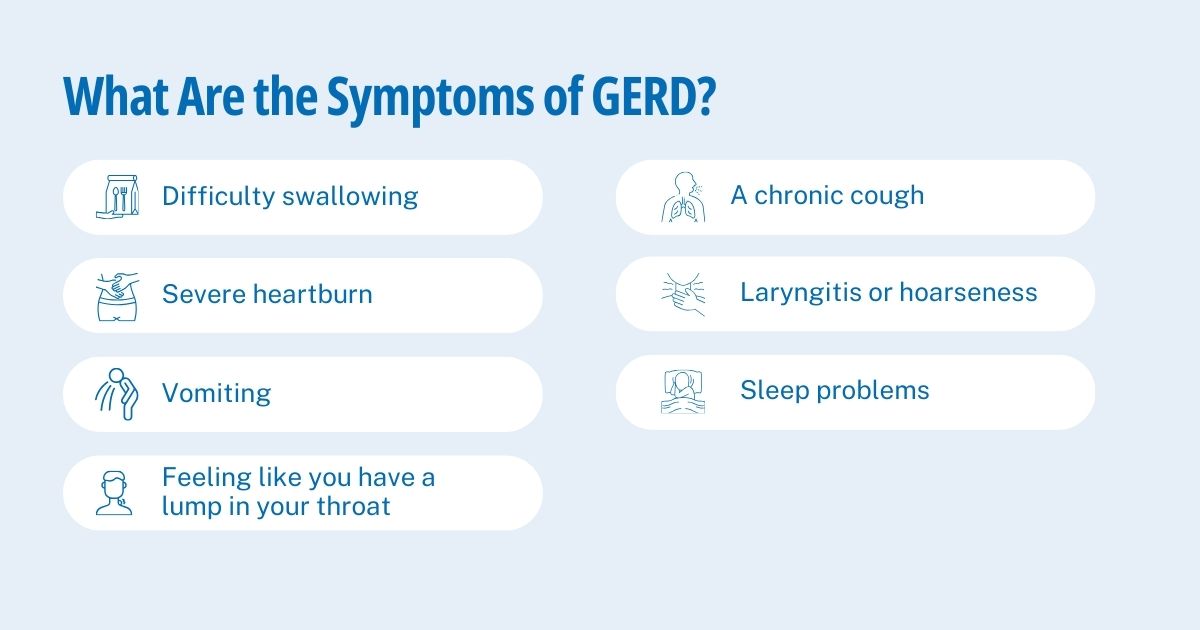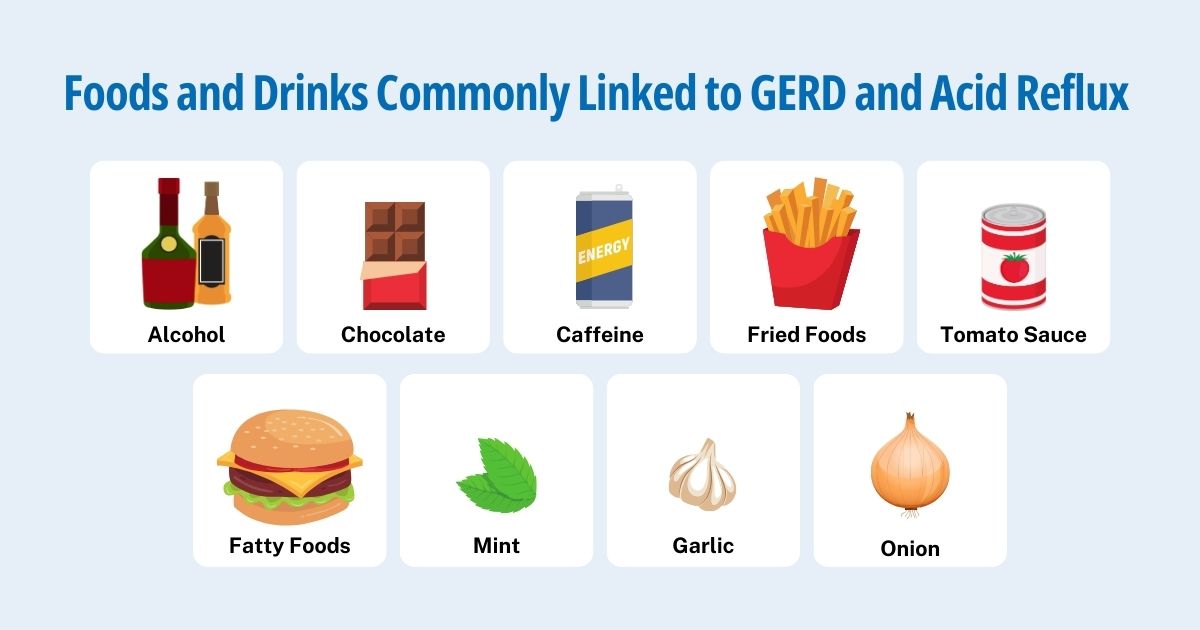How to Stop a GERD Cough: Our Expert Tips for Lasting Relief
Updated March 2025
In this article:
- What Is GERD?
- How Can I Stop an Acid Reflux Cough? Our Experts Weigh In
- What Are the Causes & Symptoms of GERD?
- Some Frequently Asked Questions About a GERD Cough
- Why See an Ear, Nose and Throat Doctor for a GERD Cough?
You may be familiar with the burning sensation of GERD-related heartburn. But can GERD also cause coughing? While it may not be the first symptom you think of when GERD is mentioned, some studies indicate that 25% (or more) cases of chronic coughing have some type of relationship with GERD.
We’ve seen it firsthand–many of our patients have come to us for help for a chronic, constant cough only to discover that GERD is a major contributor to the problem.
Reaching an accurate diagnosis is only possible when you work with leading, board-certified otolaryngologists in Raleigh like the experts at Raleigh Capitol Ear, Nose, Throat & Allergy. We’ve helped hundreds of area residents resolve their long-lasting cough by getting to the heart of the underlying cause.
Often, it can be challenging to determine whether a cough is caused by allergies, GERD or other conditions, which is why you need to work with our ENT physicians who have not only received training from prestigious universities but also have decades of experience. This crucial combination is vital to create an effective treatment tailored just for you.
Next, we’ll take a closer look at GERD, its symptoms and how our local ENT doctors in Raleigh can help provide relief.
What Is GERD?
GERD (also known as Acid Reflux) stands for gastroesophageal reflux disease. This occurs when part of the stomach’s acidic contents move up through the throat (esophagus). This causes heartburn.
However, this is no ordinary heartburn.
The heartburn caused by GERD is persistent, and it’s often not relieved by using antacids. You may have trouble swallowing and even vomit. In more extreme cases, GERD can cause respiratory problems and wear away your tooth enamel.
How Can I Stop an Acid Reflux Cough? Our Experts Weigh In
In some cases, some simple lifestyle adjustments can eliminate or minimize the effects of GERD. If not, medication may be needed.
If you have a GERD cough, we recommend these six tips:
- Maintaining a healthy weight
- Quitting smoking (if you smoke). Smoking can affect the way the esophageal sphincter functions. This is the part of your esophagus that tightens in order to keep stomach acids from backing into your throat. Smoking is also the cause of several other serious health issues, and if you smoke, you should stop.
- Elevating the head of your bed. Raising the head of your bed by six to nine inches can make a difference. Remember that using several pillows to elevate your head is not typically effective.
- Eating slowly
- Avoiding reclining after meals. Don’t don’t lie down after you eat. A good rule of thumb is to wait at least three hours before you do so. You should also avoid eating heavy meals close to bedtime.
- Avoiding tight-fitting clothing
It’s also always a good idea to avoid the drinks and food that typically cause GERD and acid reflux. (You’ll find additional information on these below).
What Are the Causes & Symptoms of GERD?
Typically, GERD is caused by problems with your lower esophageal sphincter. When this sphincter is weakened, the acid irritates your esophageal lining, causing inflammation.
Sometimes, certain medications can cause GERD. These may include:
- Certain antibiotics
- Iron supplements
- Pain relievers (like ibuprofen)

Some Frequently Asked Questions About a GERD Cough
Can Acid Reflux Cause Coughing?
Yes. Not only can GERD cause a dry cough, but it can also cause hoarseness, particularly if the stomach acid goes into your voice box (larynx). In addition, GERD can agitate asthma and cause symptoms such as wheezing and trouble swallowing.
Even if you’re not having the typical GERD symptoms, your chronic cough may still be caused by GERD. Many are surprised to learn that the issue behind their cough is not a cold, but is gastroesophageal reflux.
Be Aware That Other Conditions Can Cause Wheezing and Swallowing Problems
However, because wheezing and swallowing difficulties can be indicative of other conditions, it’s important to meet with one of our physicians who can determine the underlying cause. Whether you have GERD, allergies, a cold or different ENT issues, we are here to help.
It’s also crucial to have your chronic cough evaluated by one of our ENT doctors. Your cough could be more than just annoying and troublesome; there’s a possibility that a lingering, treatment-resistant cough with hoarseness could be a part of a more serious illness.
What Is a GERD Cough and How Is It Similar to Other Types of Coughs?
A GERD cough is a hacking cough that does not produce mucus (a dry cough). It’s also a chronic cough, meaning it has not shown improvement in eight weeks. It’s generally worse at night.
Sometimes, this may be mistaken for coughs caused by other problems such as allergies or postnasal drip.
We’ll be able to determine if the cause of your cough is from allergies or if you have a type of GERD. Once we have a diagnosis, we’ll work with you to create a plan for GERD cough treatment.
What Foods Should I Avoid If I Have Acid Reflux?

Can GERD Cause a Sore Throat?
Yes. Sore throats attributed to GERD are caused by the sting of stomach acid causing inflammation and soreness in the esophagus. There is also a type of reflux called laryngopharyngeal reflux (LPR). In this condition, the stomach acid can damage the delicate tissues of your larynx, also called the voice box.
Like GERD, it’s caused by dysfunctional muscles in your esophagus. When they weaken or have problems, the result can be GERD and / or LPR.
Can GERD Cause Asthma?
Scientists haven’t nailed down the details of the relationship between GERD and asthma. Ongoing studies show that the link is complicated.
Some research suggests that more than half (59%) of asthma patients have signs of GERD. However, less than 5% of GERD patients have an asthma diagnosis.
Many believe that when stomach acid irritates the airways, then it can trigger signs and symptoms of asthma. Still others believe the key is within the esophageal reflexes. This could tighten the airways, which can lead to breathing problems.
In fact, drugs that treat asthma may make GERD worse. However, treating GERD will frequently alleviate asthma symptoms.
Can GERD Cause Cancer?
When the stomach acid constantly irritates the lining of the esophagus, over time, this can cause damage to the cells. This means if you have consistent GERD, you may be at greater risk for developing esophageal cancer.
However, according to the American Cancer Society, most people who have GERD do not develop esophageal cancer.
What Is Barrett’s Esophagus?
Some who have GERD can develop Barrett’s esophagus, where acid damages the lining of your throat. While this condition can increase your risk of cancer, most people with Barrett’s esophagus do not develop esophageal cancer.
How Can I Determine My Cancer Risk?
We recommend working closely with one of our ear, nose and throat doctors in Raleigh so we can accurately determine your risk for esophageal cancer, taking into account factors such as your age and family history as well as your tobacco and alcohol use.
Often, throat cancers such as esophageal cancer do not show any obvious symptoms until they are more advanced and more difficult to treat.
Therefore, if you are experiencing any of the following, we encourage you to schedule an appointment with us so as soon as possible we can evaluate your condition:
- Difficulty swallowing
- Unintended weight loss
- Chronic cough
- Vomiting
- Hoarseness
- Bone pain
- Bleeding into the esophagus
Why See an Ear, Nose and Throat Doctor for a GERD Cough?
A GERD cough can be challenging to diagnose. First, you may have a GERD cough even if you aren’t experiencing heartburn or other telltale signs of GERD.
Second, it’s difficult to tell the difference between a GERD cough and those that may be caused by other factors such as allergies or postnasal drip.
That’s where we come in—as experts, we’re able to examine your throat, evaluate your cough and prescribe a specific set of treatments that can help you. We’ll also evaluate your GERD and your risk factors for throat cancer.
Let Our Experts at Raleigh Capitol Ear, Nose, Throat & Allergy Provide Lasting Relief From Your Chronic GERD Cough
If you’ve experienced the symptoms above, we encourage you to contact us for an appointment today and see why we are the ear, nose and throat doctors of choice for the Triangle area.
Key Takeaways:
- A surprising number of coughs are actually due to GERD instead of seasonal allergies.
- GERD can be caused by a variety of factors, including what you eat, problems with your esophagus and smoking.
- To relieve GERD, our suggestions include:
- Maintain a healthy weight
- Don’t recline after eating
- Eat slowly
- Sleep with the head of your bed elevated
- Avoid tight-fitting clothing
- Make changes to your diet to avoid food that makes GERD worse
- Because a chronic cough can be caused by a variety of factors—some of them serious—we recommend seeing our expert ENT physicians in Raleigh for a timely and accurate diagnosis.
The content within this article and others on this website is only for educational purposes and should not be considered as medical advice. For any questions or concerns, please consult with your healthcare provider.
====
Sources:
American Academy of Otolaryngology – Head and Neck Surgery “GERD and LPR,” https://www.enthealth.org/conditions/gerd-and-lpr/
American Cancer Society, “Survival Rates for Esophageal Cancer,” https://www.cancer.org/cancer/esophagus-cancer/detection-diagnosis-staging/survival-rates.html
Cleveland Clinic, “Heartburn,” https://my.clevelandclinic.org/health/diseases/9617-heartburn-overview
Madanick RD. Management of GERD-Related Chronic Cough. Gastroenterol Hepatol (N Y). 2013 May;9(5):311-3. https://pmc.ncbi.nlm.nih.gov/articles/PMC3740808/
Mayo Clinic, “GERD: Can Certain Medications Make It Worse?” https://www.mayoclinic.org/diseases-conditions/gerd/expert-answers/heartburn-gerd/faq-20058535
National Institute of Health, “Feeling the Burn?” https://newsinhealth.nih.gov/2018/11/feeling-burn




